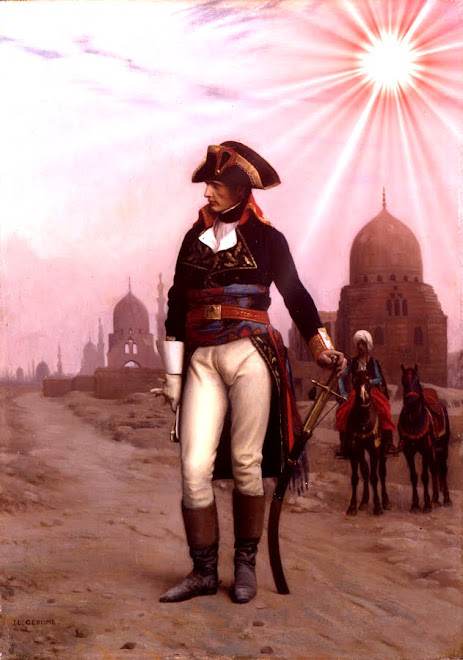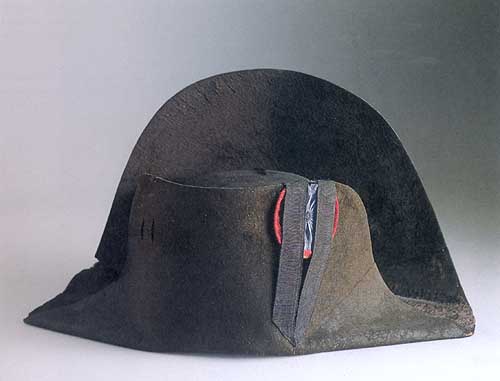I have just finished Tim Clayton's book which I much enjoyed. His
narrative is fast paced and fair to all sides. In fact, he shows just
how little Wellington deserves sole praise and the massive accolades
given to him over the years by British writers for 'his' victory.
Clayton says there were 26,000 English in Wellington's army and 30,000
Germans. And 45,000 Prussians fought at the battle. It was a battle 'the
Germans won'. Basically, Wellington and the Allies hung on by the skin
of their teeth and the smoke and confusion of battle was such that
Wellington really did not know what was happening a lot of the time,
especially on his weak left wing where he hoped and expected the
Prussians to arrive. The losses that the British Army suffered at Quatre
Bras meant that he did not really have much option but to hold on as
best he could. He deserves credit for the foresight in having chosen the
field at Mont St. Jean to fight a defensive battle and for his
fortitude on the day - although the quote that he was in such despair
before the Prussians attacked in force that he had tears in his eyes was
interesting.
The Prussians were beaten at Ligny - 65,000 French against 80,000 Prussians! Had D'Erlon's 20,000 men fought at either Quatre Bras or Ligny there would have been no Waterloo. And had Blucher, unhorsed and feared lost on June 16th, not had such an inveterate hatred of Napoleon and the French, Gneisenau would had led the Prussian army away from the British not towards them after Ligny. When the Prussians began arriving in force on the afternoon of June 18th Lobau's men and others who were preparing to attack the weakened Allied left and centre, were diverted and the day was 'saved' hours before the battle actually ended.
Clayton pays due attention to the terrible weather - what he does not know was that the eruption of Tambora in April 1815 was very likely the reason for the very unusual weather that summer. It also led to the year 'without a summer' in 1816 when the weather was so atrocious that Mary Shelley, Byron et al were stuck indoors and decided to tell each other ghost stories - Frankenstein was the result.
I was pleased to see that Clayton absolves Napoleon of the accusation that he lied to his own men when the Prussians attacked, saying it was Grouchy. Napoleon, he states, wanted and needed the 'new arrivals' to be Grouchy so much that he was only too pleased to latch onto his own hope. The author quotes several pro-Napoleonic British soldiers and surgeons etc, who say that the Bourbon restoration was hated by the French people and that Louis XVIII was only restored by British bayonets. However, Clayton also says: "Most Frenchmen were heartily sick of Bonaparte after Waterloo," mentioning a cartoon printed in August 1815 as proof - a cartoon published to please the Bourbons obviously. I think it safe to say that most Frenchmen and women preferred Napoleon to old Bungy!
He mentions too, that the treaty of capitulation negotiated by Davout after Waterloo was ignored by the Bourbons who instituted The White Terror - and that Wellington lamely said that the treaty: "was not binding on the new royalist government." In fact, Lord Liverpool insisted that the French persecute former Bonapartists and many were murdered without trial.
Above all, this book shows how sheer luck can have such an important affect on the affairs of men. Waterloo was not the great British 'victory' acclaimed over the years. So weak and decimated were the British and the Allies at the end of the battle that only the Prussians could pursue the retreating French. Clayton even infers that Wellington lost more men than Napoleon on the battlefield on June 18th.
Napoleon never wanted to fight this campaign and having marched to Paris earlier that year without a shot being fired, and enthusiastically welcomed back by most Frenchmen, he should have been allowed to govern France accordingly. But the privileged European aristocratic elites who were still terrified by the Revolution were never going to allow that. And as an ironic footnote - at the Peterloo Massacre in 1819, when ordinary people were attacked by the militia for merely discussing how their own country should be governed, a Waterloo veteran was killed by his own British cavalry. They can't blame Napoleon for that...
Well deserving of four stars.
The Prussians were beaten at Ligny - 65,000 French against 80,000 Prussians! Had D'Erlon's 20,000 men fought at either Quatre Bras or Ligny there would have been no Waterloo. And had Blucher, unhorsed and feared lost on June 16th, not had such an inveterate hatred of Napoleon and the French, Gneisenau would had led the Prussian army away from the British not towards them after Ligny. When the Prussians began arriving in force on the afternoon of June 18th Lobau's men and others who were preparing to attack the weakened Allied left and centre, were diverted and the day was 'saved' hours before the battle actually ended.
Clayton pays due attention to the terrible weather - what he does not know was that the eruption of Tambora in April 1815 was very likely the reason for the very unusual weather that summer. It also led to the year 'without a summer' in 1816 when the weather was so atrocious that Mary Shelley, Byron et al were stuck indoors and decided to tell each other ghost stories - Frankenstein was the result.
I was pleased to see that Clayton absolves Napoleon of the accusation that he lied to his own men when the Prussians attacked, saying it was Grouchy. Napoleon, he states, wanted and needed the 'new arrivals' to be Grouchy so much that he was only too pleased to latch onto his own hope. The author quotes several pro-Napoleonic British soldiers and surgeons etc, who say that the Bourbon restoration was hated by the French people and that Louis XVIII was only restored by British bayonets. However, Clayton also says: "Most Frenchmen were heartily sick of Bonaparte after Waterloo," mentioning a cartoon printed in August 1815 as proof - a cartoon published to please the Bourbons obviously. I think it safe to say that most Frenchmen and women preferred Napoleon to old Bungy!
He mentions too, that the treaty of capitulation negotiated by Davout after Waterloo was ignored by the Bourbons who instituted The White Terror - and that Wellington lamely said that the treaty: "was not binding on the new royalist government." In fact, Lord Liverpool insisted that the French persecute former Bonapartists and many were murdered without trial.
Above all, this book shows how sheer luck can have such an important affect on the affairs of men. Waterloo was not the great British 'victory' acclaimed over the years. So weak and decimated were the British and the Allies at the end of the battle that only the Prussians could pursue the retreating French. Clayton even infers that Wellington lost more men than Napoleon on the battlefield on June 18th.
Napoleon never wanted to fight this campaign and having marched to Paris earlier that year without a shot being fired, and enthusiastically welcomed back by most Frenchmen, he should have been allowed to govern France accordingly. But the privileged European aristocratic elites who were still terrified by the Revolution were never going to allow that. And as an ironic footnote - at the Peterloo Massacre in 1819, when ordinary people were attacked by the militia for merely discussing how their own country should be governed, a Waterloo veteran was killed by his own British cavalry. They can't blame Napoleon for that...
Well deserving of four stars.
C. John Tarttelin 2015
A Souladream Production




No comments:
Post a Comment